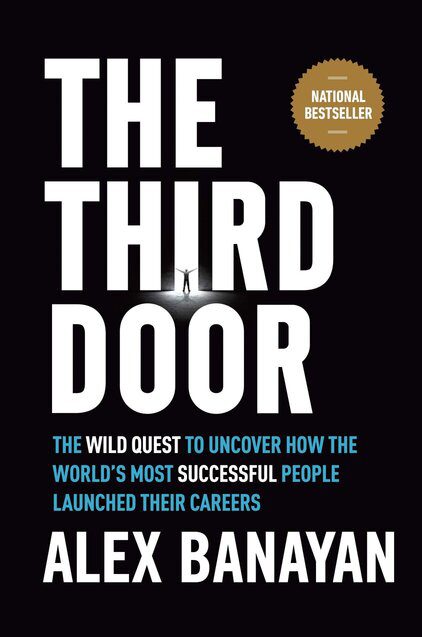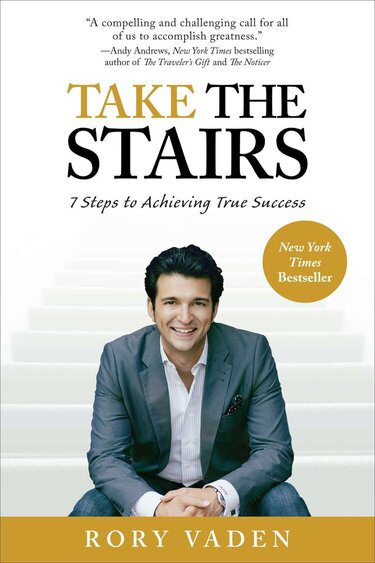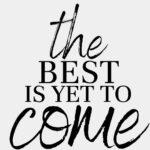In his poem, The Road Not Taken, American poet. Robert Frost wrote “Two roads diverged in a wood, and I took the one less travelled by, And that has made all the difference.” Our natural human tendency is homeostasis, our inclination to look for the path of least resistance, the easy route, the shortcuts, and go through the road often travelled. As Frost noted in his poem, taking the road less travelled made all the difference. The road less travelled is the third door, it is not obvious to most of us as it takes the relentless pursuit of a course bigger than us, it requires seeing the big picture and staying committed to our priorities and goals. To achieve anything worthwhile in life, courage is an essential component of getting great things done. If you do what everybody is doing, you will ultimately get the same result they are getting.
The third door is a metaphor for seeing beyond what is obvious and taking the road less travelled. Overnight success usually takes over 10 years of deliberate practice, consistency, commitment, perseverance, and dedication to a wildly important goal. As Henry David Thoreau observed, “If a man does not keep pace with his companions, perhaps it is because he hears a different drummer.” Getting to the next level would require changing your pace, putting in the hard work, and staying committed for the long haul even when the motivation wanes. What got you here will not take you to where you are going. The third door mentality means that there is always a way, Everything Is figureoutable. and by going the extra mile, you can open almost any door.
Reading 100 Books per year – The Third Door Approach
I started experimenting with reading 100 non-fiction books in 2016 while I was still domiciled in Nigeria. Nigeria is a country with a population of over 200 million people with less than 600 public libraries across the nation, while Lagos, its most populous city with 20 million plus inhabitants, has only 12 public libraries. The lack of public libraries in the country meant that I had to buy most of the books I read from a physical bookshop, download the ebooks, and subscribe to online platforms such as audible, Scribd (now Everand), audiobooks.com among others to achieve my yearly 100 books reading challenge. I was spending at least, 600-1000$ yearly for my personal development goals which included paying for platforms such as Linkedin Learning and Oreily, etc.
All that changed when I relocated to Canada as having access to a library card changed my approach to learning. With my free library card, I had access to a host of services and resources for free which included the ability to borrow 30 physical books every month, borrow 20+ audiobooks per month through platforms such as Overdrive, Libby, and Hoopla Digital. The public library also gave me free access to LinkedIn Learning, Online Learning with Oreilly, Online Databases, and Language Learning platforms all for free. I hardly buy books again as my library card opened a third door to achieving my goal of becoming a relentless lifelong learner. Most things that make a considerable difference in our lives are extremely simple. Who would have thought that having a library card could save me over $1000 per year and help me achieve one of the most important goals have set for myself.
‘We don’t rise to the level of our expectations, we fall to the level of our training.’ – Archilochus

In his book, The Third Door: The Wild Quest to Uncover How the World’s Most Successful People Launched Their Careers 2, author Alex Banayan describes the third door as an approach to getting things done and how the most successful people in the world utilize the approach. He writes
Life, business, success…it’s just like a nightclub. There are always three ways in.
- There’s the First Door: the main entrance, where the line curves around the block; where 99 percent of people wait around, hoping to get in.
- There’s the Second Door: the VIP entrance, where the billionaires, celebrities, and the people born into it slip through.
- The Third Door. It’s the entrance where you have to jump out of line, run down the alley, bang on the door a hundred times, crack open the window, and sneak through the kitchen—there’s always a way.
Many times the hardest part about achieving a dream isn’t actually achieving it—it’s stepping through your fear of the unknown when you don’t have a plan.
The four ways to enter the invisible third door:
- Work harder than everyone else to find a way in
- Find the back/hidden entrance
- Knock on the door 100 times until someone answers
- Use creativity to identify an entrance no one else sees

In Take the Stairs: 7 Steps to Achieving True Success 3, self-discipline strategist Rory Vaden writes about self-discipline using the “taking the stairs” vs “Escalator Mentality”.
Escalator Mentality
We are conditioned to believe that it is moral to pursue immediate satisfaction and that difficulties can always be circumvented. We don’t want to make any sacrifices, and for many of us we have never had to. Instead, the vast majority of Western societies have adopted an “escalator mentality”—one that says getting what we want shouldn’t require much work, and that there are always shortcuts in business and in life.
The problem is that the escalator mind-set is crushing our confidence and paralyzing the very actions it takes to truly become successful.
Every one of us is searching for shortcuts. In most everything we do. We’re basically programmed that way because the idea of shortcuts is being sold to us through almost every major medium in the world. We see magazine ads that tell us “how to lose weight in 4 minutes a day,” and we buy books that promise us the chance to think and attract success to come to us without us having to do a darn thing.
Staircase Mentality
Self-discipline is a habit, a practice, a philosophy, and a way of living. Taking the stairs is a mindset; but it’s not even about the stairs. You might not physically be able to take the silly stairs—but anyone can start making more disciplined choices. Despite many well-crafted marketing messages, the formula for success is no secret. It has just been long forgotten in our world of excess, and it’s so obvious that it’s elusive. The only guaranteed formula to succeed in anything is the same as it has always been.
Success comes down to choosing the hard right over the easy wrong. Consistently.
Success is never guaranteed but failure is guaranteed, if you are not acting towards achieving a worthwhile goal. As author Jim Rohn often said ” Failure is not a single, cataclysmic event. We do not fail overnight. Failure is the inevitable result of an accumulation of poor thinking and poor choices. Success is nothing more than a few simple disciplines, practiced every day; while failure is simply a few errors in judgment, repeated every day. It is the accumulative weight of our disciplines and our judgments that leads us to either fortune or failure.” Success does not happen overnight nor does failure, they are both a result of making the wrong or right decisions over a long period. What you sow is what you reap, your input determines your output. If you work hard, what is hard will work but if you take shortcuts, you will be cut short.
Success is nothing more than a few simple disciplines, practiced every day; while failure is simply a few errors in judgment, repeated every day.
Meditations
- Daily Calm with Tamara Levitt – Stitches
- Many of us live under the weight of a harsh inner critic; from a young age, we learn that we should be perfect and flawless. We are taught to be inadequate, as though we are a damaged vessel forever in need of repair, so we embark on a lifelong quest for perfection, trying to fix what is already unique and beautiful.
- Self-improvement will never bring us fulfilment if it is routed in a belief that we are fundamentally defective as a person. Our flaws make us human and whole; our conventional views, unusual habits and quirky patterns are all part of what makes us who we are. As we quiet that judgmental inner voice and replace it with compassion and kindness, we learn to love ourselves just as we are.
“I like flaws and feel more comfortable around people who have them. I myself am made entirely of flaws, stitched together with good intentions.”― Augusten Burroughs, Magical Thinking: True Stories
- Daily Jay with Jay Shetty – Unreadiness
- There is always more you can prepare for, skills you can refine, qualities you can develop, and the proverbial knife you can hone. There is always more experience you could have, but the reality is that we need to accept we might not feel totally prepared and then go ahead and start anyway. Trusting ourselves and the universe, and figuring it out along the way, that is how we accomplish incredible things.
- The most successful people in the world are not necessarily smarter or more hardworking. But they are willing to confront their unreadiness and push past it. A great amount of our ambition requires a great amount of preparation. We say things like, I will start training when I am ready, and yet, we become ready during the process, not before it begins.
Podcast
- Oprah & Arthur Brooks: Build the Life You Want – Episode 3 | Oprah’s Super Soul | OWN Podcasts
All the Best in your quest to get Better. Don’t Settle: Live with Passion.



Comments are closed.